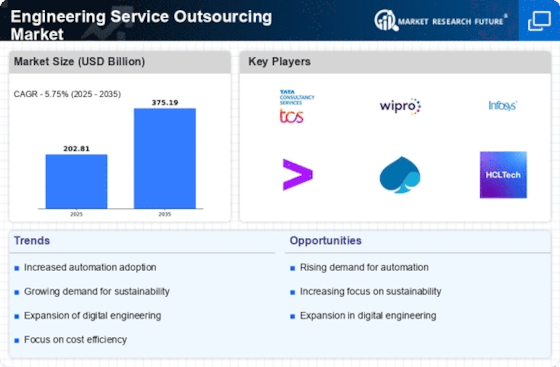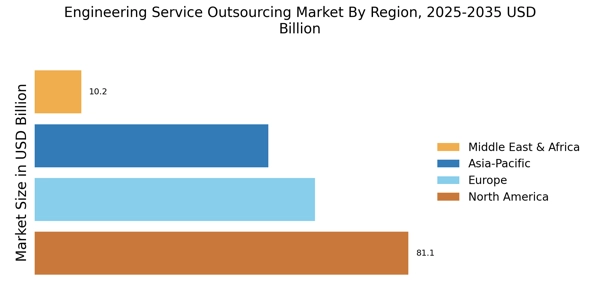Increased Focus on Innovation
Innovation is a critical driver in the Engineering Service Outsourcing Market. Companies are increasingly recognizing the importance of staying ahead in a rapidly evolving technological landscape. By outsourcing engineering services, organizations can access cutting-edge technologies and innovative solutions that may not be available in-house. This approach not only accelerates product development cycles but also enhances the overall quality of engineering outputs. Market data suggests that firms that engage in outsourcing for innovation purposes experience a 20% increase in their product development efficiency. Consequently, the emphasis on innovation is likely to propel the growth of the engineering service outsourcing sector.
Regulatory Compliance and Standards
Regulatory compliance is becoming an increasingly important driver in the Engineering Service Outsourcing Market. As industries face stringent regulations and standards, companies are turning to outsourcing to ensure compliance with local and international laws. Engineering service providers often possess the necessary expertise to navigate complex regulatory landscapes, thereby reducing the risk of non-compliance. Data shows that organizations that outsource engineering services for compliance purposes can reduce their compliance-related costs by up to 25%. This trend underscores the importance of outsourcing in maintaining regulatory standards, which is likely to continue shaping the engineering service outsourcing landscape.
Rising Demand for Specialized Skills
The Engineering Service Outsourcing Market is experiencing a notable increase in demand for specialized skills. Companies are increasingly seeking expertise in niche areas such as artificial intelligence, machine learning, and advanced manufacturing processes. This trend is driven by the need for innovation and efficiency in product development. According to recent data, the demand for engineering services in these specialized fields is projected to grow at a compound annual growth rate of over 10% in the coming years. As organizations strive to remain competitive, they are likely to outsource engineering services to tap into this specialized talent pool, thereby enhancing their capabilities and reducing time to market.
Globalization of Engineering Services
The globalization of engineering services is significantly influencing the Engineering Service Outsourcing Market. As businesses expand their operations across borders, the need for engineering services that can cater to diverse markets becomes paramount. This trend facilitates access to a broader talent pool and enables companies to leverage regional expertise. Recent statistics indicate that the outsourcing of engineering services has increased by approximately 15% in regions with emerging markets. This globalization trend not only enhances competitiveness but also fosters collaboration among engineering firms worldwide, thereby driving the growth of the outsourcing market.
Cost Efficiency and Resource Optimization
Cost efficiency remains a pivotal driver in the Engineering Service Outsourcing Market. Organizations are continually looking for ways to optimize their resources and reduce operational costs. Outsourcing engineering services allows companies to leverage lower labor costs in various regions while maintaining high-quality standards. Data indicates that firms can save up to 30% on engineering costs by outsourcing. This financial incentive encourages businesses to adopt outsourcing strategies, enabling them to allocate resources more effectively towards core competencies. As a result, the trend of outsourcing engineering services is expected to persist, driven by the quest for cost-effective solutions.

















